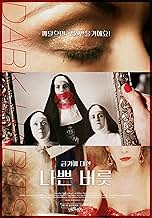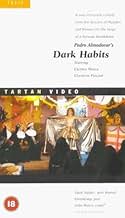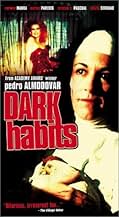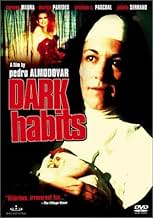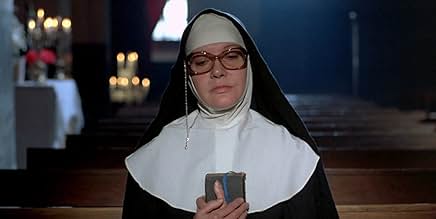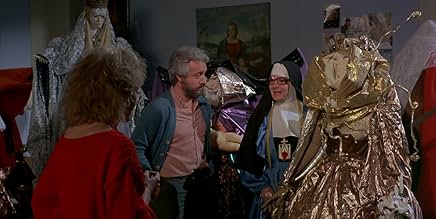IMDb-BEWERTUNG
6,5/10
8914
IHRE BEWERTUNG
Füge eine Handlung in deiner Sprache hinzuA nightclub singer seeks refuge with gay nuns on dope in a Madrid convent.A nightclub singer seeks refuge with gay nuns on dope in a Madrid convent.A nightclub singer seeks refuge with gay nuns on dope in a Madrid convent.
- Regie
- Drehbuch
- Hauptbesetzung
- Auszeichnungen
- 1 Gewinn & 1 Nominierung insgesamt
Cristina Sánchez Pascual
- Yolanda
- (as Cristina S. Pascual)
Miguel Zúñiga
- Madero
- (as Miguel Zuñiga)
Mary Carrillo
- Marquesa
- (as Mari Carrillo)
Rubén Tobías
- Policía
- (as Ruben Tobias)
Concha Grégori
- Sofia
- (as Concha Gregori)
Ángel Sánchez Harguindey
- Periodista
- (as Angel S. Harguindey)
Empfohlene Bewertungen
What else do you need to know? Honestly, this isn't Almodovar's best work. In fact, it's pretty sloppy story-wise. But I enjoyed the heck out of it. Cristina Sanchez Pascual plays a heroin-addicted singer who hides out in a convent after her boyfriend overdoses. The nuns there are, shall we say, a little quirky in that they are mostly on drugs (heroin, cocaine, acid - but not pot; at one point a nun says "you know I don't do soft drugs"). Also, one's a lesbian and another writes lurid romance novels and together they have raised a pet tiger. They all have names like Sister Snake and Sister Rat, because the humiliation is sacred. There's really no compelling reason the nuns are on drugs. It's just kind of a shocking, humorous detail. I think Bunuel would have loved it, though the film itself isn't particularly blasphemous. It doesn't view the nuns or Catholicism cynically. It just exists in its own, weird Almodovar universe. The plot is not very strong, so the whole thing just kind of fizzles, but it's entertaining. Carmen Maura plays one of the nuns, but she's not an extremely important character. On the Region 1 DVD, though, she graces the cover.
This is early Almodovar, and if you've seen his other early films, you know what to expect. If you haven't seen them, then you might be surprised. The film is funny, unpredictable, and endearing in a kinky, warped kind of way. Almodovar's nuns are wonderful characters. With straight faces and looks of piety, they do outrageous things without batting an eye. There are probably many ways to interpret the film, but I think it's about acceptance. We're all "sinners" in one way or another, as the nuns would say, and it's not up to us to judge or condemn other people. The sisters are very forgiving - in fact, they love sinners! - and they create a little haven where marginal people can find shelter. They are eccentric, they do things that mainstream society condemns, but they don't really do any harm to anyone and maybe even help some people find their path in life. This isn't the Catholic Church's idea of what a convent should be like, and I understand that very devout people would be offended by the way Almodóvar treats the subject. Still, he does it in a kind of gentle, good humored way and he offers an alternative vision of religious devotion that can make you laugh if you aren't too uptight about these things. Things don't always make sense, but that's fine, things don't make sense in life sometimes, either. Just sit back and watch, and enjoy the twists and turns.
Finally saw this film today. I laughed out loud many times. It's just so wonderfully outrageous. The nuns are played by actresses that went on to play leads in Almodovar's later films: Women on the Verge, All About My Mother, etc. The actress who plays Sister Rat figures prominently, which made me very happy, as she has had mostly very minor roles in his subsequent films. She first came to my attention in Talk To Her. She plays the concierge, and asks the reporter why her tenant is in jail. The reporter says he's innocent. She replies, I know, but innocent of what? She has right-on deadpan delivery that just knocks you out, and it's on full display in Dark Habits.
The film is less neatly constructed than Almodovar's later works, and one might say the ending is somewhat messy. Still, it's interesting to compare it to his incredibly polished work of the last ten years. While the uninitiated (to Almodovar) may find parts of it a little shocking, it's not nearly as raw as it would be if it were made today--certainly the lesbianism is tame by today's standard.
Other reviewers are right that a lot of the English subtitles miss the ironic tone in the script. But don't let that stop you . . . It's Almodovar! Even second tier Almodovar with inadequate subtitling is better than 99 percent of everything else!
The film is less neatly constructed than Almodovar's later works, and one might say the ending is somewhat messy. Still, it's interesting to compare it to his incredibly polished work of the last ten years. While the uninitiated (to Almodovar) may find parts of it a little shocking, it's not nearly as raw as it would be if it were made today--certainly the lesbianism is tame by today's standard.
Other reviewers are right that a lot of the English subtitles miss the ironic tone in the script. But don't let that stop you . . . It's Almodovar! Even second tier Almodovar with inadequate subtitling is better than 99 percent of everything else!
"Entre tinieblas": "In the Dark" maybe "Wondering about", "Somebody that has lost his/her way" would be the closest translation to the Spanish title.
"Dark Habits" is so parochial, so banal, that changes completely the message of this movie.
I just saw it today, out of nostalgia, since I own a copy, but very seldom I see a movie more than once.
Throughout the years I've seen this one three times! Every time it excels the last view. It isn't the best Almodovar. At the time he didn't have the money (and therefore the incredible terseness of his more recent filmography) nor the experience to make a work of art of every single frame, as he has accustomed us during the last several years. But this films grabs you from the very beginning with such guts that it's impossible to point out its formula.
It's simply magic.
Cristina Sánchez Pascual is not Greta Garbo, but again, like the movie itself, she has "something" in her personality that mesmerizes you whenever she's on the screen.
The way Chus Lampreave ("Sor Rata de Callejón" or "Sister Rat of the Back Alley") delivers her lines is comparable to the way Carol Channing or Eartha Kitt used to delivered theirs: Sheer pleasure to the ears and the brain.
I don't know how it could sound to somebody that needs to read the translation, but for a Spanish speaking person this woman is unique. She could read the telephone book and make it irresistibly funny.
The character of the Marquess (Mary Carrillo) is Almodovar 100%, when she comments to the Abbess Julia: "I'm a cosmetician", "¿Really?", "Of course, see my face?" and she shows an incredibly clownish face that only an inebriated cosmetician would have done.
And the Bolero that Lucho Gatica sings --"Encadenados" "Chained Together"-- is simply so gorgeous that one could melt on the spot out of utter delight, I swear. (I have to find it on "You Tube"!!).
This movie doesn't deserve 8 points, I simply gave it 8 points in my vote because of its masterly ways to grab one's imagination with not too many resources. I adore this movie. It's imperfect, the photography is not very good, the acting leaves a lot to be desired, the sets are in general quite poor..., the script...MMM-mmm, but the movie is sublime!!
"Dark Habits" is so parochial, so banal, that changes completely the message of this movie.
I just saw it today, out of nostalgia, since I own a copy, but very seldom I see a movie more than once.
Throughout the years I've seen this one three times! Every time it excels the last view. It isn't the best Almodovar. At the time he didn't have the money (and therefore the incredible terseness of his more recent filmography) nor the experience to make a work of art of every single frame, as he has accustomed us during the last several years. But this films grabs you from the very beginning with such guts that it's impossible to point out its formula.
It's simply magic.
Cristina Sánchez Pascual is not Greta Garbo, but again, like the movie itself, she has "something" in her personality that mesmerizes you whenever she's on the screen.
The way Chus Lampreave ("Sor Rata de Callejón" or "Sister Rat of the Back Alley") delivers her lines is comparable to the way Carol Channing or Eartha Kitt used to delivered theirs: Sheer pleasure to the ears and the brain.
I don't know how it could sound to somebody that needs to read the translation, but for a Spanish speaking person this woman is unique. She could read the telephone book and make it irresistibly funny.
The character of the Marquess (Mary Carrillo) is Almodovar 100%, when she comments to the Abbess Julia: "I'm a cosmetician", "¿Really?", "Of course, see my face?" and she shows an incredibly clownish face that only an inebriated cosmetician would have done.
And the Bolero that Lucho Gatica sings --"Encadenados" "Chained Together"-- is simply so gorgeous that one could melt on the spot out of utter delight, I swear. (I have to find it on "You Tube"!!).
This movie doesn't deserve 8 points, I simply gave it 8 points in my vote because of its masterly ways to grab one's imagination with not too many resources. I adore this movie. It's imperfect, the photography is not very good, the acting leaves a lot to be desired, the sets are in general quite poor..., the script...MMM-mmm, but the movie is sublime!!
"Dark Habits" from 1983 was Pedro Almodovar's first film made with a decent producer, film company, and budget.
There are signs of his later brilliance in films like "Woman on the Verge of a Nervous Breakdown" and "All About My Mother," but even for the quirky Almodovar, this is one strange film.
"Sister Act" is vaguely reminiscent of this movie, only in the fact that "Dark Habits" concerns Yolanda, a nightclub performer (Cristina Sánchez Pascual) whose boyfriend (Will More) overdoses while she's in his apartment.
Yolanda panics, afraid she will be accused of killing him by the police, so, wearing her red sequined gown, she hides out in a Madrid convent.
This is unlike any convent depicted before or since. Some of the nuns, like Yolanda herself, are drug addicts, doing heroin and coke. One nun has a pet tiger. Another writes sexy novels under a pseudonym. Another nun designs fashions and is in love with the local priest.
The Mother Superior is a lesbian and falls in love with Yolanda. The nuns all have strange names, depicting that man is the lowest form of animal: Sister Snake, Sister Rat, etc.
The big problem at the convent at the moment is that the Marquesa (Mary Carillo), now that her generous husband is dead, has decided to withdraw patronage from the convent. One of the nuns gets information about the Marquesa's daughter and decides to blackmail her with it.
"Dark Habits," I believe, suggests the Movida Madrilenia, a hedonistic countercultural movement that took place in Madrid after the death of Franco.
It was meant to represent a new Spanish identity, an identity characterized by freedom of expression, use of recreational drugs, and even a new dialect.
It was a hedonistic culture that more or less destroyed itself by the overuse of heroin. At the end of the era, Madrid was left with drug addicts, dead junkies, people leaving Madrid for their original hometowns, and for others, rehabilitation and a useful life.
The convent serves as a microcosm of this movement. Here one sees art, drugs, music, and homosexuality.
A fascinating if sometimes uncomfortable film, and certainly not representative of the later Almodovar, who himself has distanced himself from this offbeat, dark film.
There are signs of his later brilliance in films like "Woman on the Verge of a Nervous Breakdown" and "All About My Mother," but even for the quirky Almodovar, this is one strange film.
"Sister Act" is vaguely reminiscent of this movie, only in the fact that "Dark Habits" concerns Yolanda, a nightclub performer (Cristina Sánchez Pascual) whose boyfriend (Will More) overdoses while she's in his apartment.
Yolanda panics, afraid she will be accused of killing him by the police, so, wearing her red sequined gown, she hides out in a Madrid convent.
This is unlike any convent depicted before or since. Some of the nuns, like Yolanda herself, are drug addicts, doing heroin and coke. One nun has a pet tiger. Another writes sexy novels under a pseudonym. Another nun designs fashions and is in love with the local priest.
The Mother Superior is a lesbian and falls in love with Yolanda. The nuns all have strange names, depicting that man is the lowest form of animal: Sister Snake, Sister Rat, etc.
The big problem at the convent at the moment is that the Marquesa (Mary Carillo), now that her generous husband is dead, has decided to withdraw patronage from the convent. One of the nuns gets information about the Marquesa's daughter and decides to blackmail her with it.
"Dark Habits," I believe, suggests the Movida Madrilenia, a hedonistic countercultural movement that took place in Madrid after the death of Franco.
It was meant to represent a new Spanish identity, an identity characterized by freedom of expression, use of recreational drugs, and even a new dialect.
It was a hedonistic culture that more or less destroyed itself by the overuse of heroin. At the end of the era, Madrid was left with drug addicts, dead junkies, people leaving Madrid for their original hometowns, and for others, rehabilitation and a useful life.
The convent serves as a microcosm of this movement. Here one sees art, drugs, music, and homosexuality.
A fascinating if sometimes uncomfortable film, and certainly not representative of the later Almodovar, who himself has distanced himself from this offbeat, dark film.
Wusstest du schon
- WissenswertesPedro Almodóvar's first film to have a proper producer and be made for a proper film company, rather than be made on the hoof like his previous projects. Almodóvar has since distanced himself from the film as he felt that he had to bow to commercial considerations.
- PatzerThe "Salí porque salí" song is obviously not sung by Yolanda nor the backing vocalists.
- VerbindungenReferenced in El Coleta & Jarfaiter: El Piko 3 (2014)
- SoundtracksSalí porque salí
Written by J. Curiel Alonso
Arranged by Miguel Morales
Performed by Sol Pilas
Edited by Música Latina N.Y. (USA)
Top-Auswahl
Melde dich zum Bewerten an und greife auf die Watchlist für personalisierte Empfehlungen zu.
- How long is Dark Habits?Powered by Alexa
Details
- Laufzeit
- 1 Std. 54 Min.(114 min)
- Sound-Mix
- Seitenverhältnis
- 1.66 : 1
Zu dieser Seite beitragen
Bearbeitung vorschlagen oder fehlenden Inhalt hinzufügen

![Tráiler [VO] ansehen](https://m.media-amazon.com/images/M/MV5BZTI5ZGZmNGEtZmM0Mi00ZmUxLWI0ZGMtMmZmODQ0NDQzMTY5XkEyXkFqcGdeQXRyYW5zY29kZS13b3JrZmxvdw@@._V1_QL75_UX500_CR0)
